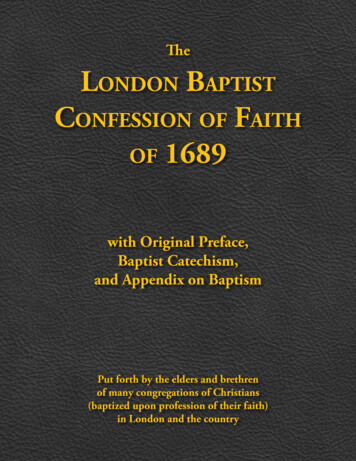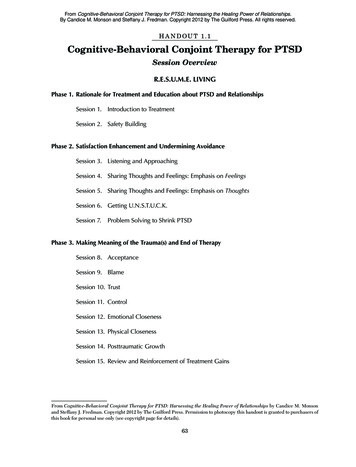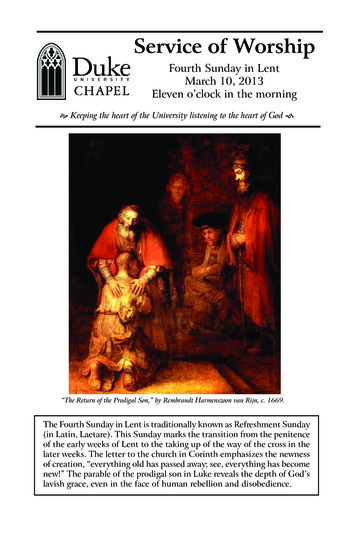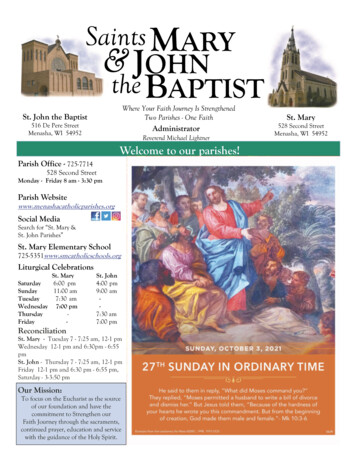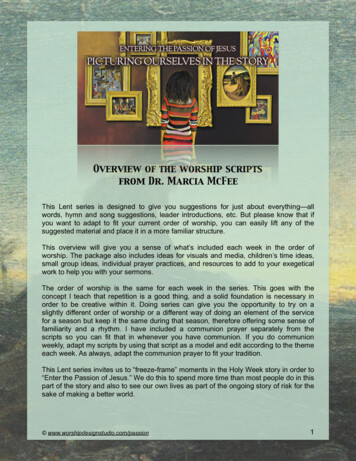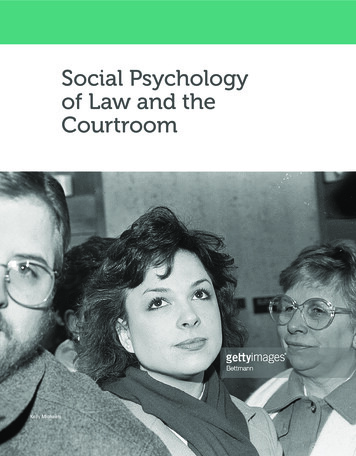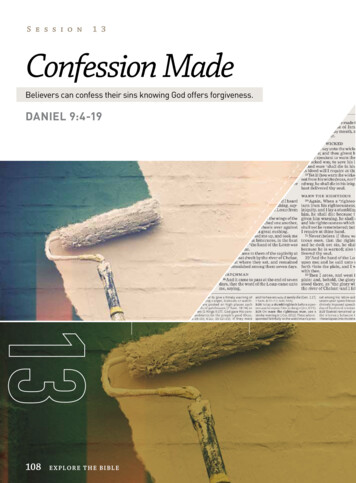
Transcription
S e s s i o n1 3Confession MadeBelievers can confess their sins knowing God offers forgiveness.DANIEL 9:4-1913108E X PL OR E T H E B I B L E
In what situations do you find it most difficult to admit you’re wrong? How canadmitting our wrongdoing to someone else actually strengthen the relationship?Many of us have a hard time saying “I’m sorry” because we struggle to admit that we arewrong. Apologizing places us in a vulnerable situation because we are confessing our failure tosomeone. Yet the forgiveness that comes after admitting our mistake can restore a relationship,and it often actually strengthens it.UNDERSTAND THE CONTEXTDuring the third year of King Belshazzar’sreign, Daniel had another dream. In thisvision, he saw a ram and a goat. The angelGabriel went to Daniel and explained thedream. The ram (Medo-Persia) was defeatedby the goat (Greece). Soon after the victory,Greece was divided into four kingdoms. Oneof the kingdoms, represented by a little horn(Antiochus Epiphanes), would rise up andoppose God’s people, even desecrating thetemple (Dan. 8:1-17).In 539-538 BC, under Medo-Persianrule, Daniel prayed to the Lord (9:1-19).He realized that Jeremiah’s seventy-yearprophecy had been fulfilled (Jer. 25:1112). Daniel confessed the sins of Israel butappeared to be more concerned with theLord’s reputation. As he was praying, theangel Gabriel appeared to him and explainedthat a time period would separate thebuilding of the temple and the coming of the“Anointed One” (Dan. 9:20-27).explaining that for three weeks he hadattempted to come to Daniel. However,a “prince of Persia” had stopped him. ButMichael, the archangel, prevailed so thatGabriel was allowed to go to Daniel (10:1-21).In chapter 11, Daniel discussed events thattook place under the Medes/Persians andGrecian kingdoms. This was a trying timefor the Jews. Daniel’s point of emphasis wasthat God is sovereign. He allowed variouskings and kingdoms to rise, and during thereign of various kings He sometimes allowedHis people to suffer. But His plans for Hiscreation are restoration and redemption. Hewill establish an everlasting kingdom. Danielencouraged believers not to compromisetheir God-given standards but to standstrong under all forms of opposition fromthe world.In 536 BC, Daniel had a vision about agreat conflict. For three weeks he mourned.The angel Gabriel came and assured him,DAT E OF M Y B I BL E S T U DY:109
DANIEL 9:4-194 I prayed to the Lord my God and confessed: Ah, Lord — the greatand awe-inspiring God who keeps his gracious covenant with those wholove him and keep his commands — 5 we have sinned, done wrong,acted wickedly, rebelled, and turned away from your commands andAordinances. 6 We have not listened to your servants the prophets, whospoke in your name to our kings, leaders, ancestors, and all the peopleof the land. 7 Lord, righteousness belongs to you, but this day publicshame belongs to us: the men of Judah, the residents of Jerusalem, andall Israel—those who are near and those who are far, in all the countrieswhere you have banished them because of the disloyalty they haveshown toward you. 8 Lord, public shame belongs to us, our kings, ourleaders, and our ancestors, because we have sinned against you.9 Compassion and forgiveness belong to the Lord our God, though wehave rebelled against him 10 and have not obeyed the Lord our God byfollowing his instructions that he set before us through his servants theprophets. 11 All Israel has broken your law and turned away, refusing toobey you. The promised curse written in the law of Moses, B the servantof God, has been poured out on us because we have sinned against him.12 He has carried out his words that he spoke against us and againstour rulers by bringing on us a disaster that is so great that nothinglike what has been done to Jerusalem C has ever been done under all ofheaven. 13 Just as it is written in the law of Moses, all this disaster hascome on us, yet we have not sought the favor of the Lord our God byturning from our iniquities and paying attention to your truth. 14 Sothe Lord kept the disaster in mind and brought it on us, for the Lordour God is righteous in all he has done. But we have not obeyed him.15 Now, Lord our God—who brought your people out of the land ofEgypt with a strong hand and made your name renowned as it is thisday—we have sinned, we have acted wickedly. 16 Lord, in keeping withall your righteous acts, may your anger and wrath turn away from yourcity Jerusalem, your holy mountain; for because of our sins and theiniquities of our ancestors, Jerusalem and your people have become anobject of ridicule to all those around us. 17 Therefore, our God, hear theprayer and the petitions of your servant. Make your face shine on yourdesolate sanctuary for the Lord’s sake. 18 Listen closely, my God, andhear. Open your eyes and see our desolations and the city that bearsyour name. For we are not presenting our petitions before you based onour righteous acts, but based on your abundant compassion. 19 Lord,hear! Lord, forgive! Lord, listen and act! My God, for your own sake, donot delay, because your city and your people bear your name.110E X PL OR E T H E B I BL EPassage OutlineConfession Made(Dan. 9:4-6)Righteousness Seen(Dan. 9:7-14)Forgiveness Sought(Dan. 9:15-19)Key WordsA. I n the latter days ofJudah, justice wasn’tpreserved, bribesdetermined the outcomeof disputes, and judgesfavored the wealthy, thusthey had turned asidefrom that which wasnecessary to preservejustice or fairness.B. “The curse and the oath”was written in the law ofMoses so they knew fullwell the consequences oftheir sin (Deut. 28:15-68;Lev. 26:14-45). The peopleknew the Law—theystudied the Law. Theirproblem wasn’t a lack ofknowing but a lack ofbelieving.C. Th ere was nothing left ofthe walls of Jerusalem orof that glorious templeSolomon had built. Thepopulation was destroyed,and the few who remainedwere unable to provideleadership or organizationfor rebuilding.
EXPLORE THE TEXTDaniel 9:1-3 provides the context for Daniel’sprayer. In 539 BC, he was reading from theBook of Jeremiah that the exile would lastseventy years (Jer. 25:11-12; 29:10). ForDaniel and some others, the exile had begunin 605 BC, so he realized it might soon end.Consequently, Daniel prayed to God andasked Him to confirm His Word.What was the importance of the wayDaniel addressed God? How did thisinitial address set the tone for the rest ofDaniel’s prayer?Daniel confessed his sin and the sins ofthe people of Israel. The verbs Daniel usedindicate that he fully acknowledged his andthe people’s accountability to the Lord.How does confession move a persontoward repentance? Which comes first,repentance or confession? Explain.KEY DOCTRINE: Salvation(Repentance) Repentance is agenuine turning from sin towardGod. (See Acts 3:19.)BIBLE SKILL: Notice repeatedwords or phrases in a Biblepassage. Daniel contrastedthe people’s sin with God’srighteousness. Read through Daniel9:4-19 slowly; listing the wordsDaniel used to describe the people’ssin and list the specific sins hearticulated. How does the varietyof ways Daniel described sin helpus understand the depth of God’sforgiveness?Daniel reminded the Lord that He had keptHis covenant with Abraham when He led thechildren out of the land of Egypt. Moreover,the Lord established a great name for Himselfin leading the children out of Egypt.How does remembering how Goddealt with His people in the pasthelp us approach God with humilityand honesty?Daniel affirmed God’s righteous character ashe prayed. In contrast, Judah had not actedrighteously. Their unrighteous acts causedthem to be taken from their land. They hadbeen shamed and disgraced.Daniel was concerned more about thereputation of the Lord than the restorationof the exiles. Daniel was indeed bothered byJudah’s sin, but he was even more concernedwith the Lord’s righteous acts (v. 16) andJudah’s failure to bring honor to the Lord’sname. He prayed: forgive them for yourown sake.How does God’s compassion andfaithfulness to His promises compelpeople to turn to Him in repentance?When praying, why is it important for usto focus on God’s name and how we bringhonor to His name?111
APPLY THE TEXT Confession is the first step in gaining reconciliation with God. Humbly acknowledging God’s righteous dealings with His people moves Hiswayward people to repentance. Forgiveness is granted by God as an act of mercy and compassion toward Hisrepentant people.Ask God to show you areas in which you are failing Him. Confess any areas ofyour life that the Lord identifies, looking for ways of honoring His name throughobedience.Reflect on the ways God has been gracious to you. Take time to thank Him for Hismercy and faithfulness. Share with a friend one way God has been gracious to you.What can your group do to more readily express God’s forgiveness and character?How can you encourage people to come to know the Lord?Prayer Requests
DAILY EXPLORATIONDay 1: Believers confess before God.Read Daniel 9:4, contemplating the beginning of Daniel’s prayer.Daniel began his prayer with confession. Ezra confessed his sin (Ezra 10:1); Nehemiahconfessed the sins of Israel (Neh. 1:6); the children of Israel confessed their sins and worshipedthe Lord (Neh. 9:2-3). But confession can also mean that we confess God’s character andattributes. The word translated confessed means to “throw oneself down” and portrays Danielon his face before God. Daniel acknowledged the Lord as His God. The title Lord recognizedGod as Lord of Daniel’s life and Lord of the world. Daniel could trust God to bring His peoplehome. The Lord was the great and awe-inspiring God. No one stood as great, and all whofeared Him held Him in reverent awe. Daniel further described the Lord as a God who keepshis gracious covenant. The word keeps carries the idea of watching or guarding, emphasizingGod’s careful attention to His covenant. The word gracious describes His covenant love towardHis people. God extended His grace to those who love him and keep his commands. They wereto love Him, and obedience to His commands demonstrated that love. Jesus also taught Hisfollowers to display their love for Him through obedience (John 14:15).What was the importance of the way Daniel addressed God? How did this initialaddress set the tone for the rest of Daniel’s prayer?Day 2: Believers repent to God.Read Daniel 9:5-6, considering Daniel’s repentance.Daniel confessed his sin and the sins of the people of Israel. The verbs Daniel used indicate thathe fully acknowledged his and the people’s accountability to the Lord. First, they had sinnedor “missed the mark.” They had fallen short of God’s righteous standard. Second, they haddone wrong. This is related to the word iniquities and contains the idea of crookedness. Third,they had acted wickedly. Fourth, they had rebelled. Fifth, they had turned away from theLord and His commands and ordinances. Sixth, they had not listened to the Lord’s servants.God, on the other hand, had shown His faithfulness in that He graciously sent His prophetsto His people. The prophets had warned the people of Israel to turn from their wicked ways.However, the nation refused to listen and had turned their backs on the Lord. Though Godhad remained faithful to Israel, they had rebelled and repeatedly turned away from Him.How does confession move you toward repentance? Which comes first, repentance orconfession? Explain.113
Day 3: Repentance leads to experiencing forgiveness.Read Daniel 9:7-14, noticing how Daniel repents thoroughly and with detail.God had made a covenant with Israel, and had provided His law as a means for knowing howto live in covenant with Him. The Lord gave Israel prophets to proclaim the law. Yet the nationhad rebelled against the Lord. Deuteronomy 28:15-68 spelled out the curses that would comeupon Israel if they did not follow the Lord’s principles and precepts. Daniel knew there wouldbe consequences if the people did not follow God’s ways. Turning away from Him would bringdisaster. (See also Deut. 30:18.) The phrase kept the disaster in mind and brought it on us isdifficult to understand. It appears that Daniel was conveying the thought that God had notimpulsively judged Judah. The Lord had been longsuffering with His judgment. But Judahhad not listened, nor had they learned from the Northern Kingdom of Israel. Therefore, God’sjudgment came upon Judah. Daniel appealed to God for compassion and forgiveness. Thepeople could receive forgiveness if they turned to God. God works the same way with us today.When we have sinned, we need to acknowledge God’s righteous dealings with us. He has beenfaithful to us, and any failure lies with us. When we acknowledge how righteously God hasdealt with us, it can move us toward repentance—repentance that leads to confessing our sinand experiencing God’s forgiveness (1 John 1:9).How does God’s compassion and faithfulness to His promises compel you to turn toHim in repentance?Day 4: God shows compassion to His people.Read Daniel 9:15-16, identifying how Daniel reminded God of past actions.Daniel pleaded with God on the basis of His compassion. He knew the destruction ofJerusalem and the temple came because of the sins of the people. They could not plead theircase for restoration based on their own righteousness. Rather, Daniel called on God to bringhonor to His own name: Jerusalem and your people have become an object of ridicule to allthose around us. Other nations mocked God’s people; even worse, they mocked Israel’s God.Daniel did not want that. When the shepherd boy David —who later became Israel’s king—fought Goliath, he was angry that Goliath would taunt the armies of the living God (1 Sam.17:26). He realized God’s honor was at stake. David defeated Goliath and brought honor toGod’s name. Likewise, Daniel recognized God’s honor was at stake. He pleaded with God toforgive His people.How does remembering how God dealt with His people in the past help us approachGod with humility and honesty?114E X PL OR E T H E B I BL E
Day 5: Forgiveness is granted as an act of mercy.Read Daniel 9:17-19, noting Daniel’s posturetoward God.Throughout his prayer, Daniel affirmed God’s holy characterand confessed the people’s failure. As long as the people lived inexile and the land lay desolate, God’s honor suffered. Those whowitnessed Israel’s plight may have doubted God’s ability to restoreHis people. Because the reputation of God’s name was at stake,Daniel urged God to act quickly and decisively. Daniel recalledGod’s past compassionate dealings with Israel. He called on Godto act graciously yet again, trusting not in the worthiness of thepeople but in God’s compassion. Forgiveness is granted by God asan act of mercy and compassion toward His repentant people. Wecan never measure up to God’s righteous standard. But God sentHis Son, the Lord Jesus Christ, as sin’s perfect sacrifice once andfor all (Heb. 9:12-14). When we repent of our sins and place ourfaith in Jesus, we receive God’s salvation and forgiveness (Rom.10:9-10).When praying, why is it important for you to focus on God’sname and how you bring honor to His name?TALK IT OUTReflect on the truths found in Daniel 9, sharingwith the other members of your Bible study group.What did Daniel affirm about God’s character inthese verses?How did Daniel contrast God’s righteousness withIsrael’s sin in these verses?How does Daniel’s prayer compare to prayers of today?115
Daniel further described the Lord as a God who keeps his gracious covenant. The word keeps carries the idea of watching or guarding, emphasizing God's careful attention to His covenant. The word gracious describes His covenant love toward His people. God extended His grace to those who love him and keep his commands . They were

